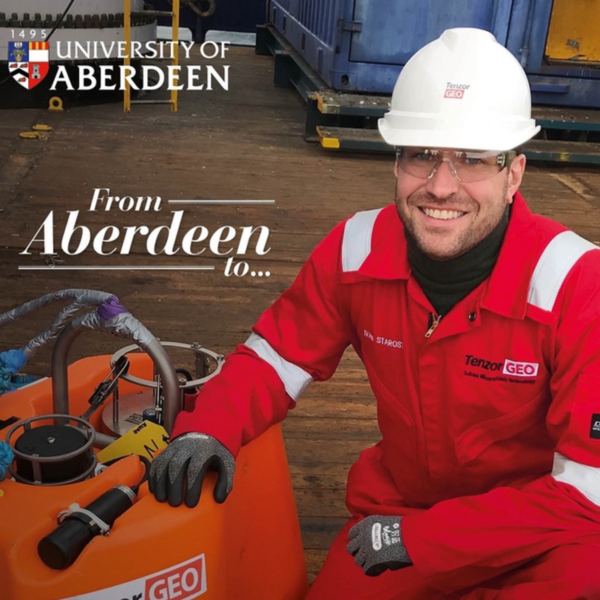
Introduction
The MSc Oil and Gas Enterprise Management provides the essential commercial, legal and scientific skills needed to progress to senior management level positions in the international hydrocarbons industry.
- This course has both January and September start dates.
- Eligible self-funded international Masters students will receive the Aberdeen Global Scholarship. Visit our Funding Database to find out more.
Study Information
Study Options
- Learning Mode
- On Campus Learning
- Degree Qualification
- MSc
- Duration
- 12 months
- Study Mode
- Full Time
- Start Month
- September or January
This long-established interdisciplinary programme develops your business, legal and technological skills to provide a thorough understanding of the entire oil and gas lifecycle, from exploration & production (E&P) through to commercialisation, within the broad economic and legal context of the oil and gas industry.
The MSc Oil and Gas Enterprise Management is taught by industry-based experts, who bring with them the latest industry trends and techniques to ensure that what you learn on this programme is relevant to the needs of the upstream oil and gas industry today. Industry-led teaching is further supported by input from researchers and academic experts from across the University of Aberdeen, including from the School of Geosciences, Business School, and School of Law.
The University’s location at the heart of the oil and gas industry means students benefit from direct access to industry, not only through lectures from industry experts, but also through field trips, site visits, industry-supported projects as well as numerous other networking and careers events that take place in Aberdeen.
A key feature of this programme is the residential field course, where students visit a number of industry locations across the North East of Scotland, including for example, manufacturing installations for offshore exploration, oil terminals, and various supply chain companies that provide key services for the oil and gas sector in Aberdeen.
For the final project, you can choose to focus on any element of the programme, from the commercial, legal, scientific or technical aspects of the oil and gas industry, depending on their particular interests and career ambitions.
Every year, the programme attracts students from around the world and from a variety of academic backgrounds, including geology, business, law, engineering, and economics as well as graduates of other disciplines who have relevant industry experience.
Available Programmes of Study
- MSc
-
Oil and Gas Enterprise Management
Qualification Duration Learning Mode Study Mode Start MonthMSc 12 months On Campus Learning Full Time January MoreMSc 12 months On Campus Learning Full Time September More
We will endeavour to make all course options available; however, these may be subject to timetabling and other constraints. Please see our InfoHub pages for further information.
Fee Information
Additional Fee Information
- Fees for individual programmes can be viewed in the Programmes section above.
- In exceptional circumstances there may be additional fees associated with specialist courses, for example field trips. Any additional fees for a course can be found in our Catalogue of Courses.
- For more information about tuition fees for this programme, including payment plans and our refund policy, please visit our InfoHub Tuition Fees page.
International Applicants
Further Information about tuition fees and the cost of living in Aberdeen
Funding Opportunities
- Aberdeen Global Scholarship: Eligible self-funded international Masters students will receive the Aberdeen Global Scholarship.
- NEO Energy, an independent full-cycle energy business in the UKCS, are offering two postgraduate scholarships valued at £20,000 each. Find out more.
- Shell U.K. Limited is offering three £20,000 scholarships for students starting a Masters programme aligned with the Centre for Energy Transition (CET) commencing in September 2024. Find out more.
Visit our Funding Database to find out more and see our full range of scholarships.
Scholarships
Self-funded international students enrolling on postgraduate taught (PGT) programmes will receive one of our Aberdeen Global Scholarships, ranging from £3000 to £8,500, depending on your domicile country. Learn more about the Aberdeen Global Scholarships here.
To see our full range of scholarships, visit our Funding Database.
How You'll Study
Learning Methods
- Field Trips
- Field Work
- Group Projects
- Individual Projects
- Lectures
- Research
- Tutorials
Assessment Methods
Assessment comprises of practical exercises and research papers and essays, where students can access information from a wide array of sources, including Oil Industry journals, periodicals and other papers which are available to them. Many of the courses include ‘games’ spread over several days, which require team and negotiating skills, as well as a knowledge of technology and economics, which draw the various courses together.
Why Study Oil and Gas Enterprise Management?
- We have the right experts teaching in each of the areas that the programme covers - geology, business, economics, science, engineering and law.
- This programme is open to you if you are from a geoscience, engineering, law, economics, commerce or various other backgrounds.
- The industry works to projects. Project teams are made up of all key disciplines. You will experience a similar feel to the way we teach this programme and the fact you will be studying alongside individuals from a variety of backgrounds and nationalities will enhance your experience further.
- The combination of academic expertise across a number of disciplines and course input from industry professionals ensures that you get the very best learning experience.
- You will undertake what many students identify as the highlight of the programme, a one-week field trip to view exploration and production facilities in an area of the UK.
- You will develop the experience and confidence required to talk to specialists across the science, engineering and commercial value chain in the upstream oil industry and be given the chance to develop your transferable skills in report-writing, team-work, creative thinking, and problem-solving.
- We have created a world-class learning environment and we pride ourselves on being a close community of staff and students, working together and sharing experiences.
- Research in the department focuses on subsurface earth science and its deeper time record. To the department’s traditional strengths in petroleum geology, sedimentology, stratigraphy, geochemistry we have recently added significant expertise in geophysics, tectonics, structural geology to form a major research team with the goal to elucidate geological processes in sedimentary basins and their underpinning tectonics.
- Organisations that we work with across a number of areas include – Apache, Statoil, Baker Hughes, BP, Chevron, Conoco Phillips, Dana Petroleum, Halliburton, BP, Shell, Pemex and SaudiAramco, to name a few. These links, and more, help us deliver world-class teaching and research.
- We deliver our programmes from world-class facilities with a number of our MSc programmes having dedicated study and teaching space available.
Entry Requirements
Qualifications
The information below is provided as a guide only and does not guarantee entry to the University of Aberdeen.
2:1 (upper second class) UK Honours degree, or an Honours degree from a non-UK institution which is judged by the University to be of equivalent worth, in Geology, Geophysics, Engineering, Law, Economics, Commerce, Business or Finance. Joint Business and Computing degrees may also be considered.
Applicants with a good degree and relevant work experience will also be considered.
Please enter your country to view country-specific entry requirements.
English Language Requirements
To study for a Postgraduate Taught degree at the University of Aberdeen it is essential that you can speak, understand, read, and write English fluently. The minimum requirements for this degree are as follows:
IELTS Academic:
OVERALL - 6.5 with: Listening - 5.5; Reading - 6.0; Speaking - 5.5; Writing - 6.0
TOEFL iBT:
OVERALL - 90 with: Listening - 17; Reading - 21; Speaking - 20; Writing - 21
PTE Academic:
OVERALL - 62 with: Listening - 59; Reading - 59; Speaking - 59; Writing - 59
Cambridge English B2 First, C1 Advanced or C2 Proficiency:
OVERALL - 176 with: Listening - 162; Reading - 169; Speaking - 162; Writing - 169
Read more about specific English Language requirements here.
Document Requirements
You will be required to supply the following documentation with your application as proof you meet the entry requirements of this degree programme. If you have not yet completed your current programme of study, then you can still apply and you can provide your Degree Certificate at a later date.
- CV
- an up-to-date CV/Resumé
- Degree Certificate
- a degree certificate showing your qualifications
- Degree Transcript
- a full transcript showing all the subjects you studied and the marks you have achieved in your degree(s) (original & official English translation)
- Personal Statement
- a detailed personal statement explaining your motivation for this particular programme
International Applicants
Aberdeen Global Scholarship
Eligible self-funded post graduate taught (PGT) students will receive the Aberdeen Global Scholarship. Explore our Global Scholarships, including eligibility details, on our dedicated page.
Aberdeen Global ScholarshipsCareers
Each year, on average, over 90% of our graduates move into employment or further research, with the vast majority moving into the oil and gas industry. As you are covering such a broad range of courses on the programme and you are being exposed to the industry during the 12 months, you are graduating with a set of skills that are in high demand across a number of different job roles.
If you have worked hard during the degree and pushed yourself to achieve good results then a number of career opportunities are open to you.
Career Opportunities
- Business Development Coordinator
- Commercial Adviser
- Field Services Coordinator
- Junior Drilling Consultant
- Process Engineer
- Project Manager
What our Alumni Say
Our Experts
- Other Experts
- Dr David Muirhead
- Professor Andrew Hurst
- Professor David Macdonald
- Programme Coordinator
- Dr Stephen Bowden
Information About Staff Changes
You will be taught by a range of experts including professors, lecturers, teaching fellows and postgraduate tutors. Staff changes will occur from time to time; please see our InfoHub pages for further information.
Get in Touch
Contact Details
- Address
-
Student Recruitment & Admissions
University of Aberdeen
University Office
Regent Walk
Aberdeen
AB24 3FX






